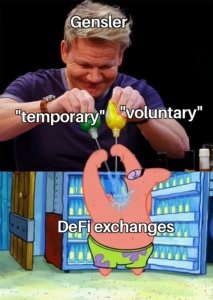 It doesn’t matter who you ask — crypto regulation is a tough puzzle to solve. There are people who live in the “unregulated wild west” camp that would like DeFi and cryptocurrency to stay completely unregulated. Then there are those who would like limited regulation, but at least some regulatory clarity. Then there are others who want to bring cryptocurrency fully into the state’s hands or even sideline it in favor of a CBDC. But no matter where you fall, I don’t think anyone disagrees that even attempting to craft legislation that would create some kind of regulatory control is a monumental task.
It doesn’t matter who you ask — crypto regulation is a tough puzzle to solve. There are people who live in the “unregulated wild west” camp that would like DeFi and cryptocurrency to stay completely unregulated. Then there are those who would like limited regulation, but at least some regulatory clarity. Then there are others who want to bring cryptocurrency fully into the state’s hands or even sideline it in favor of a CBDC. But no matter where you fall, I don’t think anyone disagrees that even attempting to craft legislation that would create some kind of regulatory control is a monumental task.
That’s why, instead of taking the time to fully understand and construct crypto regulation fitted to new technologies in a new age, government agencies are taking a bit more of a backdoor approach. Here are some of the ways crypto is being regulated “unofficially,” and how they may be useful… or not.
Expanding language
One way regulators drag crypto up in their regulatory nets without creating and passing specific crypto regulations is by expanding language and definitions. For example, in a proposal targeting treasury markets platforms which never specifically mentions DeFi or cryptocurrency, the SEC uses the broad term “communications protocol systems,” which many DeFi lobbyists are afraid will apply to crypto, slipping in the backdoor. That can hurt if you’re not expecting it.
To be honest, I don’t see much of a pro to this kind of backdoor regulatory control. The whole point of creating rules, ostensibly anyway, is to protect investors and clarify boundaries. Making language more vague and subject to interpretation seems solely beneficial to the people in charge of interpreting the language. *cough* regulators *cough*
Playing dirty
 There are other ways agencies seem to want to gloss over their responsibility to fairly and clearly define the rules of the game. Ripple and the SEC, for example, are in the middle of a lawsuit in which the SEC is trying to crack down on the company whose token XRP has taken a big hit. Ripple is attempting to make a “fair notice” defense, saying it was not given fair notice by the SEC that XRP would be considered a security. As of now, the case is not over but the fair notice defense is still on the table.
There are other ways agencies seem to want to gloss over their responsibility to fairly and clearly define the rules of the game. Ripple and the SEC, for example, are in the middle of a lawsuit in which the SEC is trying to crack down on the company whose token XRP has taken a big hit. Ripple is attempting to make a “fair notice” defense, saying it was not given fair notice by the SEC that XRP would be considered a security. As of now, the case is not over but the fair notice defense is still on the table.
Another tactic the SEC uses to sneak through backdoor crypto regulations is to shorten the window of time to receive comments. By only giving 30 days instead of a reasonable 90, lawyers and lobbyists don’t have enough time to fully understand and make comments. Both of these sly tactics could spell trouble for DeFi, which is a major con. There is a pro however. If, for example, Ripple ends up winning its lawsuit, the SEC will have shot its own foot. Try it again, Gensler!
“Working together”
 From the mouth of Gary Gensler himself, the SEC also tries to gain regulatory control by asking DeFi exchanges to “come to us” instead of creating new, clear, and specific rules. Of course the SEC would like cryptocurrency platforms to just come and subject themselves to existing regulations — that saves a lot of trouble. But trouble for whom?
From the mouth of Gary Gensler himself, the SEC also tries to gain regulatory control by asking DeFi exchanges to “come to us” instead of creating new, clear, and specific rules. Of course the SEC would like cryptocurrency platforms to just come and subject themselves to existing regulations — that saves a lot of trouble. But trouble for whom?
I suppose you could see it as a pro in the sense that cryptocurrency and DeFi lobbyists wouldn’t have to fight the good fight. But then, “voluntary” and “temporary” regulations are a classic way for agencies to fudge the process and effectively enforce rules that are not officially put in place.
Where is crypto regulation going?
So what’s the takeaway on backdoor crypto regulation? Well — it’s happening. No regulation, sadly, is not an option, however much some may want it. Clear and swift regulation is also not likely when executive orders basically just ask for “more inquiries, hurrah!” Perhaps there will be satisfactory and measured regulations in the future. But if you’re a fan of cryptocurrency, you probably know why regulatory control makes most hodlers jumpy.
About the Author

Michael Hearne
About Decentral Publishing
Decentral Publishing is dedicated to producing content through our blog, eBooks, and docu-series to help our readers deepen their knowledge of cryptocurrency and related topics. Do you have a fresh perspective or any other topics worth discussing? Keep the conversation going with us online at: Facebook, Twitter, Instagram, and LinkedIn.


